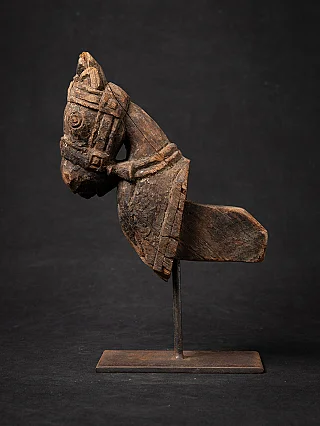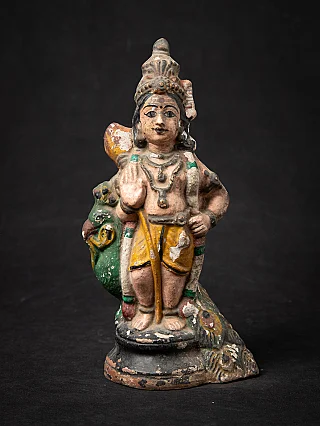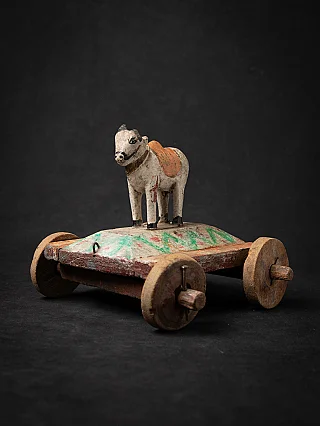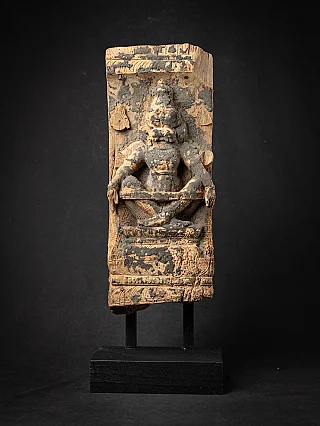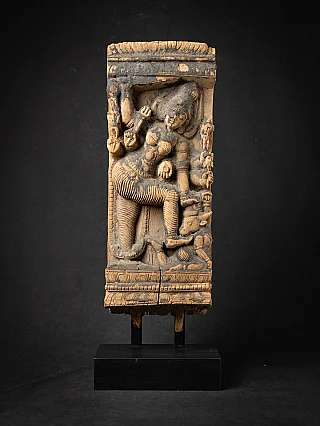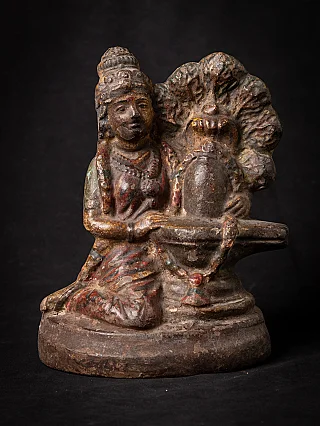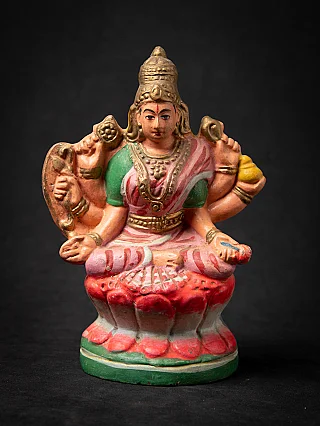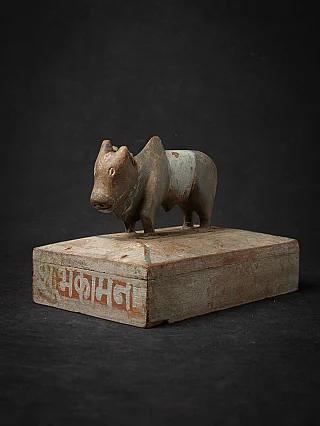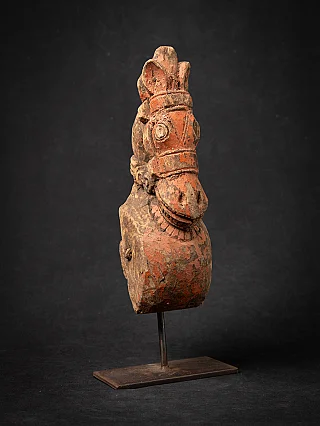Maha Shivaratri - A Great Hindu Festival of Lord Shiva
Author : Peter Vredeveld

Exquisite collection of Hindu God statues
Mahashivaratri, known as "the Great Night of Shiva," is one of the most revered and significant Hindu festivals dedicated to Lord Shiva, the Supreme Being, and the deity of destruction and transformation. Celebrated with immense devotion across the Indian subcontinent and beyond, Mahashivaratri holds profound spiritual, cultural, and social significance in the hearts of millions of devotees.
Observed on the 14th night of the lunar month of Phalgun (February or March) according to the Hindu calendar, Mahashivaratri marks a sacred occasion for devotees to seek blessings, offer prayers, and engage in spiritual practices to honor Lord Shiva and attain spiritual awakening.
Legend of Mahashivaratri

The legend of Mahashivaratri originates in Hindu mythology, revolving around various ancient tales and scriptures praising Lord Shiva's greatness. One of the most prominent legends associated with Mahashivaratri is the story of the churning of the ocean (Samudra Manthan) as recounted in the Puranas.
According to Hindu mythology, when the devas (celestial deities) and asuras (demons) churned the ocean to obtain the divine nectar of immortality (amrita), numerous celestial beings and treasures emerged from the depths of the sea. However, amidst the churning process, a deadly poison known as Halhala surfaced, threatening to destroy the universe.
Alarmed by the imminent catastrophe, the devas and asuras sought the aid of Lord Shiva, the Supreme God of the Hindu pantheon. In his infinite compassion and sense of duty towards creation, Lord Shiva consumed the potent poison to prevent it from wreaking havoc upon the cosmos. Lord Shiva held it in his throat to neutralize the poison's lethal effects, which turned blue, earning him the epithet "Neelakantha" (the blue-throated one).
The day Lord Shiva consumed the poison and saved the universe from destruction is celebrated as Mahashivaratri, symbolizing the triumph of good over evil, light over darkness, and divine grace over adversity. Devotees commemorate this auspicious occasion by offering prayers, performing rituals, and observing spiritual practices to express their gratitude to Lord Shiva and seek his blessings for spiritual well-being and worldly prosperity.
Rituals and Traditions

Mahashivaratri is marked by many rituals and traditions observed by devotees with unwavering devotion and reverence. These rituals vary across regions and communities, each with unique significance and symbolism. However, certain core rituals are universally practiced during Mahashivaratri, uniting devotees in their collective worship of Lord Shiva.
1. Fasting
Fasting holds immense significance during Mahashivaratri, where devotees refrain from food and water for the entire or part of the day to express self-discipline, purification, and devotion. Fasting is believed to purify the body, mind, and soul, allowing devotees to attain spiritual clarity and connect with the divine.
2. Night-long Vigils (Jagran)
Devotees engage in night-long vigils, known as Jagran, staying awake and immersed in prayers, meditation, and devotional singing in honor of Lord Shiva. Temples and sacred sites resonate with the musical chants of "Om Namah Shivaya" and hymns praising Lord Shiva, creating an atmosphere of spiritual hunger and divine grace.
3. Abhishekam (Holy Bath)
Abhishekam, the ritualistic bathing of Lord Shiva's idol or lingam (an abstract representation of Shiva's divine energy), is performed with various sacred substances such as milk, honey, yogurt, ghee, and water. Each offering symbolizes purity, devotion, and gratitude, invoking the blessings of Lord Shiva for spiritual upliftment and worldly prosperity.
4. Offering Bilva Leaves
Devotees offer Bilva leaves (Aegle marmelos) to Lord Shiva, considering them highly auspicious and dear to the deity. The trifoliate shape of the bilva leaf symbolizes the three aspects of consciousness—sattva, rajas, and tamas—and their transcendence into the divine realm. Offering bilva leaves is believed to please Lord Shiva and fulfill devotees' desires.
5. Visiting Shiva Temples
Pilgrimages to sacred shrines and temples dedicated to Lord Shiva are standard practices during Mahashivaratri. Devotees throng to renowned pilgrimage sites such as Kashi Vishwanath Temple in Varanasi, Somnath Temple in Gujarat, and Pashupatinath Temple in Nepal to express their devotion through prayers and seek divine blessings from Lord Shiva.
Significance of Mahashivaratri
Mahashivaratri bears immense spiritual importance within Hinduism, providing followers a sacred occasion to pursue divine blessings, spiritual awakening, and release from the eternal cycle of life and death. The festival embodies the essence of devotion, austerity, and self-sacrifice, guiding devotees on the path of righteousness, inner purification, and spiritual evolution.
1. Spiritual Awakening
Mahashivaratri is considered an auspicious occasion for spiritual awakening and self-realization, enabling devotees to transcend worldly attachments and connect with their divine essence. The rigorous observance of fasting, meditation, and worship purifies the mind, body, and soul, facilitating the attainment of spiritual enlightenment and inner peace.
2. Removal of Obstacles
Mahashivaratri is revered as an auspicious time for overcoming life's obstacles, challenges, and adversities. Devotees fervently pray to Lord Shiva, the remover of obstacles (Vighnaharta), seeking his divine intervention and blessings to overcome hurdles, fulfill their aspirations, and lead a harmonious and fulfilling life.
3. Renunciation of Ego
Mahashivaratri inspires devotees to relinquish their ego, desires, and attachments, following in the footsteps of Lord Shiva, who epitomizes humility, austerity, and detachment. Devotees strive to attain selflessness, compassion, and inner tranquility by renouncing worldly distractions and material pursuits and aligning themselves with the divine will.
4. Celebration of Unity
Mahashivaratri transcends religious and social boundaries, uniting people of diverse backgrounds, beliefs, and cultures in harmony, brotherhood, and reverence for Lord Shiva. The festival fosters a sense of communal solidarity and collective worship, reinforcing the universal principles of love, compassion, and mutual respect.
Celebrations and Festivities

Mahashivaratri is celebrated with unparalleled enthusiasm and zeal, encompassing a plethora of cultural, religious, and social festivities that resonate with the divine aura of Lord Shiva. The festival brings communities together in joyous celebration, cultural performances, and holy zeal, fostering a sense of spiritual upliftment and communal harmony.
1. Temple Processions
Temples dedicated to Lord Shiva witness grand processions and religious ceremonies during Mahashivaratri, with devotees carrying colorful banners, floral garlands, and sacred offerings as they circumambulate the sanctum sanctorum in a symbolic gesture of reverence and devotion.
2. Cultural Performances
Mahashivaratri is marked by vibrant cultural performances, including classical dance recitals, devotional music concerts, and theatrical presentations that depict the life and legends of Lord Shiva. Artists and performers pay homage to Lord Shiva through their creative expressions, invoking divine blessings and inspiration.
3. Devotional Music and Dance
Worshippers partake in devotional singing, bhajans, and joyous dancing, called tandava, as a heartfelt expression of their deep reverence and affection towards Lord Shiva. The rhythmic beats of drums (tabla), cymbals (manjira), and bells (ghungroo) reverberate through temples and homes, creating an atmosphere of spiritual ecstasy and divine bliss.
4. Pilgrimage and Sacred Rituals
Pilgrims embark on sacred journeys to renowned Shiva temples and holy sites, seeking the divine blessings of Lord Shiva and performing sacred rituals and ablutions to purify their souls and invoke divine grace. The chanting of sacred mantras, the recitation of Vedic hymns, and the offering of prayers sanctify the atmosphere and elevate the spiritual consciousness of devotees.
Spiritual Practices and Observances
Mahashivaratri offers devotees a promising opportunity to engage in spiritual practices and observances to deepen their connection with Lord Shiva and attain spiritual enlightenment. These practices include meditation, chanting sacred mantras, reading scriptures, and acts of charity and selfless service, purifying the mind, elevating consciousness, and cultivating divine virtues.
1. Meditation
Mahashivaratri is an ideal time for devotees to immerse themselves in deep meditation, contemplating the divine attributes of Lord Shiva and transcending the limitations of the ego and the intellect. Through meditation, devotees cultivate inner peace, mental clarity, and spiritual awareness, fostering a profound sense of union with the divine.
2. Chanting of Mantras
Devotees chant sacred mantras dedicated to Lord Shiva, such as the Panchakshara mantra ("Om Namah Shivaya") and the Maha Mrityunjaya mantra, invoking divine blessings, protection, and spiritual illumination. The rhythmic repetition of mantras purifies the mind, calms the senses, and awakens the divine consciousness within.
3. Reading of Scriptures
Devotees engage in the study and contemplation of scriptures such as the Shiva Purana, Linga Purana, and Rudram, which extol the glory, virtues, and divine manifestations of Lord Shiva. The sacred texts serve as a source of spiritual wisdom, inspiration, and guidance, illuminating the path of devotion and self-realization.
4. Acts of Charity
Mahashivaratri encourages devotees to perform acts of charity, compassion, and selfless service as a means of purifying the heart, accumulating positive karma, and expressing love and empathy towards all beings. Devotees offer the needy food, clothing, and alms, visit orphanages and shelters, and engage in environmental conservation and social welfare activities, embodying the spirit of divine love and universal brotherhood.
Mahashivaratri, the Great Night of Shiva, embodies the timeless essence of devotion, austerity, and spiritual enlightenment, offering devotees an opportunity to transcend worldly limitations and merge with the divine consciousness of Lord Shiva. The occasion commemorates the victory of light over darkness, enlightenment over unawareness, and divine benevolence over hardship, instilling in adherents the aspiration to embrace a path of virtue, empathy, and profound spiritual insight. As devotees immerse themselves in prayers, rituals, and spiritual practices during Mahashivaratri, they seek to purify their minds, elevate their souls, and awaken the dormant divinity within. In the sacred silence of the night, amidst the echoes of sacred chants and the glow of divine lamps, devotees commune with Lord Shiva, the eternal source of peace, love, and liberation, and experience the ineffable joy of divine union.
Mahashivaratri transcends the boundaries of time and space, uniting devotees in a timeless celebration of devotion, faith, and divine grace. As the auspicious festival unfurls its sacred essence, may devotees be bestowed with the celestial aura of Lord Shiva, the quintessential epitome of affection, empathy, and everlasting joy, and may their souls resonate with limitless ardor and reverence for the Great Lord of the Cosmos.
Share this page

























